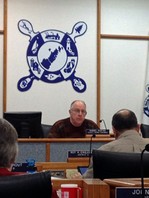Q&A with Dan Austad
- Share
- Tweet
- Pin
- Share
In 1959, a high school senior named Dan Austad got his first taste of government when he was sent by his school to serve on a local committee (“Quite frankly I don’t even remember what it was,” says Austad. “I’m pretty sure it was county not city. I didn’t go to very many meetings.”). Fifty-three years later, Austad has become a mainstay of Door County government and the current chair of the Door County Board of Supervisors.
Pulse reporter Matt Ledger sat down with Austad to talk about why he’s so interested in government and why so many people aren’t.
Matt Ledger (ML): You’ve been working in government for a long time. Why do you keep going back to it?
Dan Austad (DA): I’m retired now; I’ve been retired about seven years. I don’t want to belittle the fact that government gives you something to do, that’s not the right statement to make. But you feel like you’re doing something.
I certainly didn’t have any agenda when I got here, and I still don’t have an agenda. Some people come on the county board with an agenda. Cure this and fix that. I don’t have any agenda. I just flow with the issues.
ML: What kind of issues do interest you though?
DA: I’m really interested, and have been over the years, with the museums. I was involved with the [Door County Historical Museum] when they expanded, and I’ve been pretty heavily involved with the maritime museum. I happen to be the president over there, and I’ve been involved for 20, 25 years.
But that isn’t an agenda. It’s just very interesting. Government is very, very complicated, if you haven’t figured that out by now. Especially county government because of all the programs and 300-some employees and 30-some committees.
ML: As chairman how do you manage that? Are you pretty hands-on?
DA: You’ve got to remember when [former chairman and fellow supervisor] Leo [Zipperer] and I started, and we kind of went along this together, the county clerk did everything.
Since then we’ve hired an administrator. At one time the district attorney handled a lot. Now we have a corporate counsel, an assistant corporate counsel, we have a lawyer in the child support agency, we have a lawyer in the courthouse, we have a district attorney, an assistant district attorney. We have a full-time finance director. We have a full-time HR person.
So, my forte now is to motivate and delegate. I feel that with that group of people they should be doing most of the digging, and we just have to set policy and let them run the show. We interfere a lot of times, but that’s human nature.
You’ve been to enough county board meetings now.
ML: I’m amazed at how many of the votes there are just straight yes or no votes.
DA: In my opinion that’s the way it should be at the county board level. If you want to see the arguments and get into the arguments you’ve got to go to the committee meetings. All the stuff should already be ironed out so you’re not in front of the people standing up and…I don’t think we’ve ever stood up and shouted and screamed at each other, but in the last three days we’ve been into some really tough things.
It’s really going to get tough in the next year or so because of Act 10. Probably the toughest decision is how to bring the health insurance, and the whole county government, back in line a little bit with the private sector. Some of these people when you find out what they’re getting paid, unless you make $75,000 a year, you’re going to be amazed at some of the salaries these people make on the county level.
So I think we’re going to have our hands full, because we’re at the [tax] levy limit [set by the state] and we either have to cut some services or cut some people or do something to stay under the levy limit.
Health insurance is what we’re working on right now. That and the senior center. Something has to be done out there; it either has to be fixed or remodeled or replaced.
ML: You’ve said repeatedly that government is interesting. What’s the most interesting thing you’ve learned?
DA: Did I learn it in life or did I learn it in government, but most people don’t care about government until their ox is gored. I bet you could go up and down the street and interview 100 people and 80 of them don’t know who their county board supervisor is.
People just don’t really care I guess. Is that apathy? I don’t know what that is.
ML: Yeah, I guess when you see something like the lists for the April elections, where there are so many elections with just one person running, is that usual?
DA: Yes, and in my opinion there’s a couple reasons for that. In a lot of them you’ll see when there’s an open spot, six or eight people apply for it, whether it be for school board or city council because they don’t have to lose in a popular election.
The other thing is in Door County, because everybody knows everybody, people don’t want to run against people they know. I’ve had a lot of people say I’d like to run for county board, but I don’t want to run against you. And you’d like to think they don’t want to run against you because they think you’re doing a good job.
People just don’t want to get involved; they don’t want to get in arguments and discussions. And it’s time consuming. So some people just don’t have time to do it.
Look at the county board – there are few members that actually have a job that requires them to be there all day, every day.
[Approximately 17 of the current 21 board members are retired or don’t have 9-to-5 jobs.]
As you get older though, age does have its experiences and that’s a good thing. Experience is more important than age on the county board, experience with the whole system.
ML: How long did it take you to learn the system?
DA: I don’t think I have yet. Not even close. Not even close at all.



